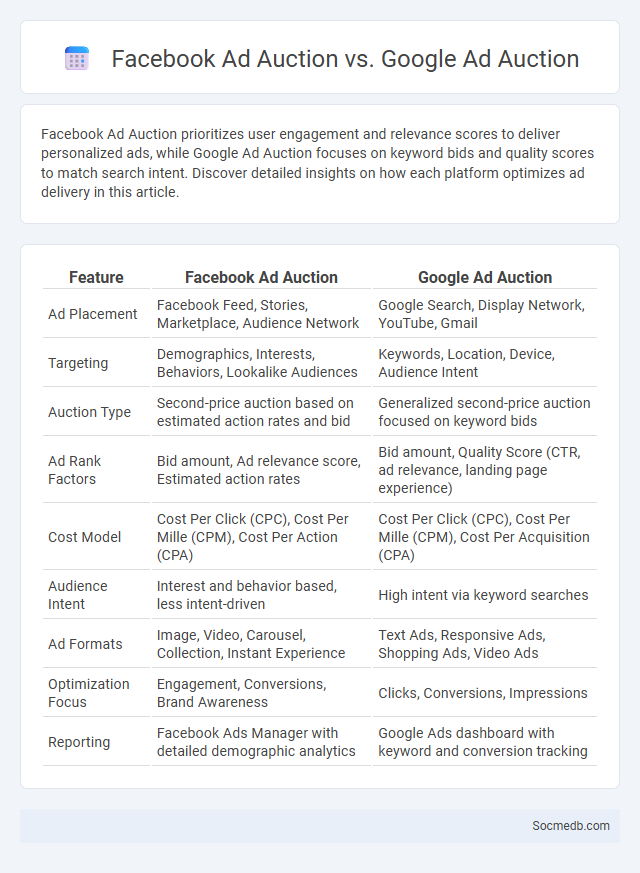
Photo illustration: Facebook Ad Auction vs Google Ad Auction
Facebook Ad Auction prioritizes user engagement and relevance scores to deliver personalized ads, while Google Ad Auction focuses on keyword bids and quality scores to match search intent. Discover detailed insights on how each platform optimizes ad delivery in this article.
Table of Comparison
| Feature | Facebook Ad Auction | Google Ad Auction |
|---|---|---|
| Ad Placement | Facebook Feed, Stories, Marketplace, Audience Network | Google Search, Display Network, YouTube, Gmail |
| Targeting | Demographics, Interests, Behaviors, Lookalike Audiences | Keywords, Location, Device, Audience Intent |
| Auction Type | Second-price auction based on estimated action rates and bid | Generalized second-price auction focused on keyword bids |
| Ad Rank Factors | Bid amount, Ad relevance score, Estimated action rates | Bid amount, Quality Score (CTR, ad relevance, landing page experience) |
| Cost Model | Cost Per Click (CPC), Cost Per Mille (CPM), Cost Per Action (CPA) | Cost Per Click (CPC), Cost Per Mille (CPM), Cost Per Acquisition (CPA) |
| Audience Intent | Interest and behavior based, less intent-driven | High intent via keyword searches |
| Ad Formats | Image, Video, Carousel, Collection, Instant Experience | Text Ads, Responsive Ads, Shopping Ads, Video Ads |
| Optimization Focus | Engagement, Conversions, Brand Awareness | Clicks, Conversions, Impressions |
| Reporting | Facebook Ads Manager with detailed demographic analytics | Google Ads dashboard with keyword and conversion tracking |
Understanding the Concept of Ad Auctions
Ad auctions are the automated processes that determine which advertisements appear on social media platforms based on bidding, relevance, and user engagement. Social media networks like Facebook, Instagram, and Twitter use these auctions to allocate ad space efficiently, prioritizing ads that offer the best value for both advertisers and users. Understanding ad auctions helps you optimize your marketing strategy by targeting the right audience and maximizing your ad budget's impact.
How Facebook Ad Auction Works
Facebook Ad Auction determines which ads appear by evaluating bid amount, estimated action rates, and ad quality to maximize value for both users and advertisers. Your ad competes in real-time auctions where Facebook calculates a total value score based on your bid, predicted user engagement, and ad relevance. Winning ads are those that deliver the highest combined value, ensuring efficient targeting and cost-effectiveness for your campaigns.
How Google Ad Auction Operates
Google Ad Auction functions by analyzing the quality and relevance of your ads alongside the bid amount you place, determining which ads appear on search results or partner websites. Ad rank, a key metric derived from your bid and quality score, dictates the order in which ads are displayed, ensuring that users see the most pertinent advertisements. Understanding this process allows you to optimize your social media advertising strategy, maximizing visibility and engagement.
Key Differences Between Facebook and Google Ad Auctions
Facebook ad auctions prioritize user engagement by leveraging detailed demographic, interest, and behavior data to target ads within its social ecosystem. Google ad auctions operate primarily on keyword relevance and bid price, using search intent to determine ad placement across its search engine and display network. The key difference lies in Facebook's focus on social graph and audience segmentation versus Google's emphasis on intent-driven keyword auctions.
Ad Auction Algorithms: Facebook vs Google
Facebook and Google utilize complex ad auction algorithms to maximize advertiser ROI by prioritizing relevance, bid amount, and user engagement signals. Google's auction emphasizes keyword intent and quality score to match ads with search queries, while Facebook leverages detailed user data and behavior patterns to deliver highly targeted social ads. Your advertising strategy benefits from understanding these distinctions to optimize campaign performance across both platforms.
Targeting Options in Facebook vs Google Ad Auctions
Facebook offers highly detailed targeting options based on user demographics, interests, behaviors, and social connections, allowing advertisers to create precise audience segments. Google Ad Auctions prioritize keyword intent, enabling ads to appear in search results and across the Display Network based on user queries and browsing behavior. While Facebook excels in interest-based targeting within its social ecosystem, Google delivers intent-driven targeting that captures users actively seeking specific information or products.
Cost Structure: Facebook Ad Auction vs Google Ad Auction
Understanding the cost structure differences between Facebook Ad Auction and Google Ad Auction is crucial for optimizing your advertising budget. Facebook Ad Auction operates on a value-based bidding system, prioritizing user engagement and relevance, while Google Ad Auction focuses on keyword bids and Ad Rank, incorporating Quality Score factors like expected click-through rate, ad relevance, and landing page experience. Your campaign's efficiency depends on selecting the platform that aligns with your target audience behavior and bid strategy within these distinct auction mechanisms.
Factors Influencing Ad Rank and Relevance
Ad rank and relevance on social media platforms depend significantly on factors such as user engagement rates, ad quality, and bid amount. Algorithms prioritize content that aligns closely with your target audience's interests and behaviors, boosting visibility and effectiveness. Optimizing these elements enhances your campaign's performance and ensures that your ads reach the most relevant users.
Choosing the Right Ad Auction Platform for Your Campaign
Selecting the right ad auction platform for your social media campaign hinges on understanding audience targeting precision, bid strategy flexibility, and platform reach. Facebook Ads and Google Ads offer robust auction systems with diverse targeting options, while LinkedIn Ads excels in B2B segmentation. Tailoring your choice to campaign goals, budget constraints, and competitive bid environments maximizes ad spend efficiency and conversion rates.
Future Trends in Digital Ad Auctions
Future trends in digital ad auctions indicate a shift towards programmatic advertising driven by artificial intelligence and machine learning algorithms, enhancing real-time bidding accuracy and efficiency. Privacy regulations and the decline of third-party cookies are accelerating the adoption of first-party data strategies and contextual targeting to optimize ad relevance. Emerging blockchain technology also promises greater transparency and fraud prevention in digital ad marketplaces, transforming how advertisers and publishers engage in automated auctions.
 socmedb.com
socmedb.com